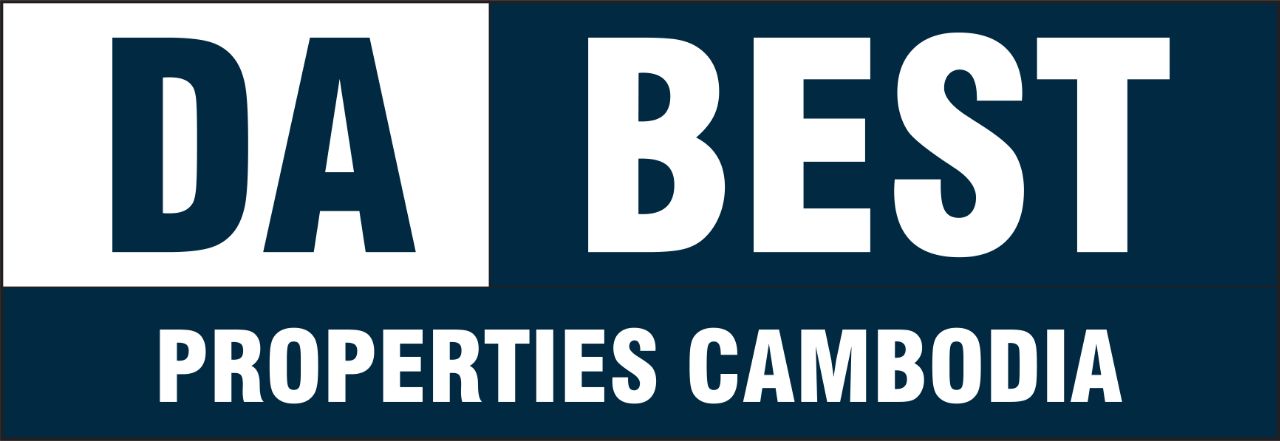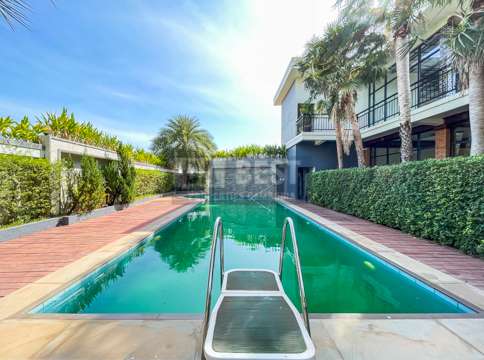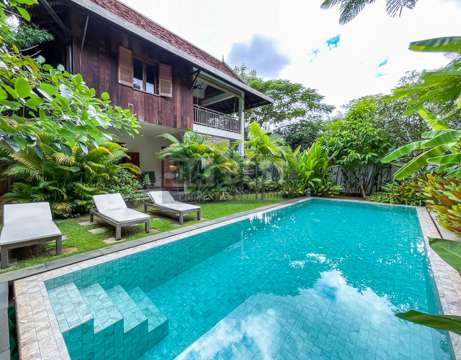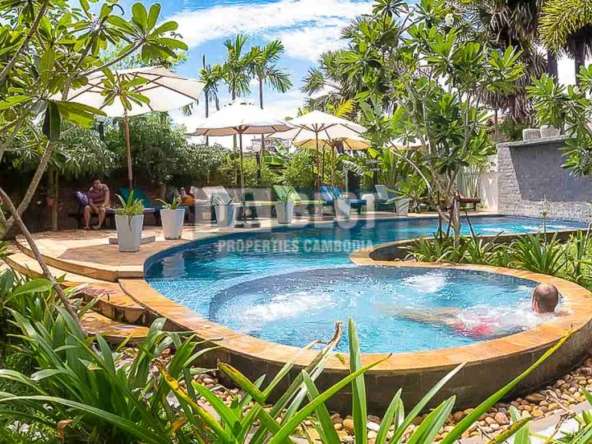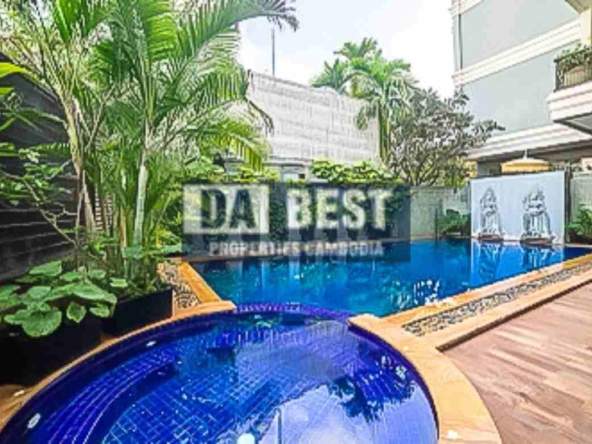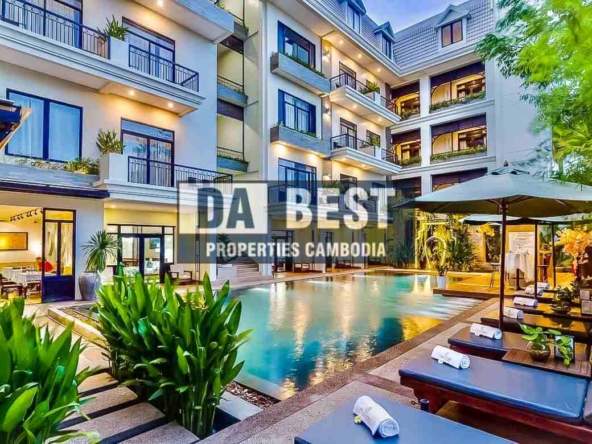Boutique Hotels for Sale in Siem Reap
For those seeking to invest in Siem Reap’s hospitality industry, there are various opportunities to purchase boutique hotels. Here’s an evaluation of boutique hotels for sale in Siem Reap.
| Hotel Name | Location | Number of Rooms | Asking Price (USD) |
|---|---|---|---|
| Villa Wat Damnak | Wat Damnak Village | 7 | $780,000 |
| Cocina Hotels & Resort | Krous Village Road | 15 | $2,750,000 |
| Total: | - - - - - - - - - | 22* | $3,5300,000# |
These boutique hotels possess uniqueness in architecture and interior design inspired by the ancient culture of Cambodia. Moreover, Siem Reap is a gateway to access one of the greatest landmarks that attract millions of tourists across the globe– Angkor Wat temple complex. Investing in Boutique hotels will be beneficial as they offer guests a unique experience coupled with tranquil surroundings away from major tourist areas. Pro Tip: Before making any purchase decision, ensure property titles and legal documentation are regulated according to Cambodian laws. Buying a boutique hotel without considering the factors is like playing Russian Roulette with your wallet.
Factors to Consider Before Purchasing a Boutique Hotel
To make an informed decision before purchasing a boutique hotel in Siem Reap, you need to consider various factors that can impact the success of your investment. In order to do that, you need to pay attention to key factors such as location, size, operational costs, licensing and legal requirements, and reputation and branding.
Location
The geographic placement of the boutique hotel is a crucial factor that one should consider before making a purchase.
- Accessibility: The hotel must be easily accessible to major transit points, shopping, and entertainment centers.
- Quietness: One must consider local noise pollution levels, such as traffic or nearby construction.
- Safety: The locality must be secure for guests at all hours, with low crime rates.
- Scenery: A beautiful view adds value to the experience of staying in a boutique hotel.
- Tourism demand: Geographical areas with high tourism demand will enhance business prospects.
- Culture and community events: Being situated near cultural and communal events can help create a more immersive guest experience.
Additionally, factors such as zoning laws for commercial properties in the location are critical considerations.
Pro Tip: Use maps and detailed descriptions to help your guests better understand the neighborhood surrounding the hotel.
When it comes to boutique hotels, size may not matter, but layout sure does- nobody wants to feel like they are sleeping in a Tetris game.
Here are some great examples of our Boutique Hotels for Sale in Siem Reap
Bungalow Hotel For Sale In Siem Reap – Sala Kamroeuk
- $450,000
- Beds: 9
- Baths: 10
- Hotel for Sale, Hotel, Other / Commercial
Hotel 86 Rooms For Sale In Siem Reap
- $6,000,000
- Beds: 86
- Hotel for Sale, Hotel, Other / Commercial
Commercial Villa Resort With Swimming Pool For Sale in Siem Reap
- $745,000
- Beds: 6
- Baths: 6
- Villa for sale, Hotel for Sale, Hotel, House / Villa, Other / Commercial
Tropical Boutique Hotel For Sale In Siem Reap – Svay Dangkum – SRH184
- $580,000
- Beds: 15
- Baths: 16
- Hotel for Sale, Hotel, Other / Commercial
36 Bedroom Hotel For Sale in Siem Reap-Svay Dangkum
- $1,600,000/neg
- Beds: 36
- Baths: 38
- Hotel for Sale
43 Room Boutique Hotel For Sale in Siem Reap
- $3,600,000/neg
- Beds: 43
- Baths: 43
- Hotel for Sale
Size and Layout
Size and Configuration: The size and layout of a boutique hotel are crucial factors that must be considered before making a purchase. It is important to ascertain the number of rooms, distribution, communal areas, and compatibility with other facilities in the neighborhood.
A table containing relevant information pertaining to size and configuration can aid buyers in their decision-making process. The columns may include total area, number of rooms, size of each room (in square feet), communal areas, and shared amenities. Using this information, one can analyze a prospective property’s potential investment value.
In addition to the standard considerations regarding the size and layout of a boutique hotel, there are other unique aspects to consider. For example, if your target guests are couples or families with children, then larger rooms with more space become critical. On the other hand, if your focus is on solo travelers or backpackers who tend to require less space and amenities than couples or families.
Pro Tip: A well-designed boutique hotel doesn’t need copious space; instead, it should create an atmosphere in which visitors will want to spend time outside their room. Consider using indoor-outdoor spaces such as terraces or rooftops for guests to relax and spend time while maintaining social distance.
Why have a bank account when you can just open a boutique hotel and watch your money disappear into operational costs?
Operational Costs
When considering the day-to-day business expenses of a boutique hotel, it’s important to evaluate all aspects of Operation Costs. This includes all operational expenses such as maintenance, staffing, utilities, and supplies. For instance, maintaining the exterior and interior of the building should be considered while hiring staff for cleaning and carrying out repairs. It is imperative to assess an emergency fund, accounting for any unexpected maintenance issues or hiccups in staff coverage.
Furthermore, one must not forget that investing in high-quality services will provide a profitable outcome in the long run. However, it is essential to create accurate budgets from the start before making investment decisions based on inaccurate estimates. Moreover, focused management strategies are primordial as proper management guarantees smooth operations leading to optimized profits.
A crucial aspect that must also be assessed is guest satisfaction since poor ratings can have a detrimental impact on sales revenue. Providing guests with appealing features like access to spa treatments or offering transportation may raise occupancy rates and reviews.
To strengthen our analysis clearly, consider the scenario of a four-room boutique hotel situated in Venice packed with ecstatic reviews praising their delicious breakfast specialties and personalized attention given by their staff who usually speaks three or four languages each. While excited about recent expansion proposals presenting promising growth prospects; after going through their accounting books for a better understanding of running costs- they realized restaurant expenditure was disproportionately high due to earlier negligence of keeping an inventory log. By assessing running costs through precise data tracking mechanisms exploited during frequent internal audits can sustain profitability even amidst fast-changing trends and fads over time – this equips curious investors with an improved approach towards scoring bigger wins with reduced risks compared to conventional methods used today.
As seasonality fluctuations present challenges against having optimum cash flows, thorough data-driven alternatives when managing resources shield clients from adverse scenarios while protecting businesses against unforeseen industry changes as already experienced above.
Before jumping into the world of boutique hotels, remember: more licenses mean more headaches, but fewer licenses mean more trouble with the law.
Licensing and Legal Requirements
When considering the legal and regulatory aspects of purchasing a boutique hotel, there are several important factors to keep in mind. Ensuring compliance with these requirements is crucial for the smooth operation of the business and avoiding legal issues.
A table can be helpful in providing an overview of the necessary licenses and permits for operating a boutique hotel. Below is a list of some essential licenses and permits required to operate a boutique hotel in most regions:
| License/Permit | Description |
|---|---|
| Business License | This license permits you to operate your business legally. |
| Food Service Permit | If you plan to offer food or beverages, this permit will allow you to do so safely and legally. |
| Lodging Permit | A lodging permit allows you to rent out rooms or spaces in your hotel property. |
| Zoning Permit | Ensure that your selected property meets zoning laws for commercial use. |
Beyond these mandatory requirements, it may also be necessary to obtain additional permits or certifications depending on the location. Some hotels must adhere to specific safety regulations such as fire safety codes, health codes, disability access regulations.
In addition to following legal requirements, risk management strategies should be put into place. It is vital for any potential buyer to conduct thorough due diligence regarding contracts while engaging specialized experts that provide underwriting support during due diligence.
Neglecting regulatory compliance in either licensing or insurance areas may lead you – as an owner – without adequate protection against future loss events covered by appropriate policies, thus rendering your investment vulnerable. Consulting with an attorney can often help protect both buyer and seller interests during every stage of transfer.
It’s important not to underestimate the importance of compliance when running a boutique hotel property. Avoid being caught up at any point in time unprepared by focusing on meeting both regulatory needs while seeking tailored risk management expertise based on site-specific parameters.
Remember, a good reputation is like gold…a bad one is like a stain you can never wash out, especially in the highly competitive world of boutique hotels.
Reputation and Branding
Establishing a reputable and distinctive brand identity is pivotal for any boutique hotel to stand out in today’s competitive marketplace. A unique branding strategy and distinct positioning can attract guests and differentiate it from other hotels. It is important to create a brand personality that resonates with the target audience, conveys the hotel’s philosophy, and creates an emotional connection with guests.
It is imperative to maintain consistency across all branding activities, such as website design, social media presence, advertising campaigns, guest experiences, and customer service standards. Furthermore, keeping track of online reviews, engaging with customers on social media platforms and responding promptly to feedback can improve the hotel’s reputation.
Guests expect authenticity from boutique hotels; therefore maintaining the original architecture of the building or establishing a link with local culture can add character and uniqueness to the property. This approach offers a memorable experience that can foster positive word-of-mouth marketing among guests.
One boutique hotel in Bali grasped this concept by constructing their guest room suites in traditional Indonesian Joglos. The unique design stood out as an architectural statement while preserving Balinese heritage without compromising modern luxury amenities. This created buzz among travel enthusiasts and was widely covered in travel publications across different platforms.
Siem Reap’s boutique hotels: so many options, you’ll feel like a kid in a candy store…except instead of candy, it’s luxurious accommodations.
Available Boutique Hotels in Siem Reap
To explore the available boutique hotels for sale in Siem Reap, dive into the section on “Available Boutique Hotels in Siem Reap” with a focus on “Description of Properties,Price Range,Potential Revenue Streams,Investment Opportunities and Risks” as your guide. This will give you a quick overview of each property’s features and enable you to analyze the risks and rewards involved in investing in one of these hotels.
Description of Properties
This section sheds light on the unique qualities and features of boutique hotels in Siem Reap, Cambodia.
A table providing relevant information about available boutique hotels in Siem Reap is presented below. Each hotel’s key features, location, room rate per night, and distance from major attractions are included for easy comparison.
| Hotel | Key Features | Location | Room Rate per Night | Distance from Major Attractions |
|---|---|---|---|---|
| Hotel A | Outdoor pool, garden | City centre | $90 | 2 km |
| Hotel B | Spa, restaurant | Angkor Archaeological Park | $120 | 1 km |
| Hotel C | Free shuttle, bar | City centre | $80 | 3 km |
The hotels provide world-class accommodations with exceptional service that ranges from car rental to recreational activities such as golfing and horseback riding. Moreover, several offer free shuttles to the airport or town centre alongside breakfast.
In previous years, most visitors preferred staying in big chain hotels during their stay in Siem Reap until Boutique hotels provided an intimate yet grand experience for them.
Your wallet won’t go on vacation when you stay at these chic boutique hotels in Siem Reap.
Price Range
Exploring the different lodgings in Siem Reap, we present a variation of the ‘Price Range’ for boutique hotels. The table below features actual data of rooms rates per night.
| Hotel Name | Lowest Price (USD) | Highest Price (USD) |
|---|---|---|
| Sala Lodges | 195 | 360 |
| Shinta Mani Shack Angkor | 183 | 480 |
| Jaya House River Park | 180 | 370 |
| The Beige Hotel Siem Reap | 237 | 300 |
For those not looking to break the bank, Jaya House River Park offers budget-friendly options from $180 per night. It’s also worth noting that some hotels offer discounts based on the length of stay or time of booking.
A friend once shared an experience where they stayed at one of the listed hotels and were surprised by complimentary breakfast delivered straight to their room daily. Such small gestures could make a significant impact on one’s stay.
Unlock the potential of your wallet with these revenue streams – because let’s face it, those boutique hotels in Siem Reap won’t pay for themselves.
Potential Revenue Streams
Potential revenue sources for the available boutique hotels in Siem Reap are diverse and include:
- Room rentals can provide steady income from regular travelers and big groups.
- Dining services, including breakfast buffets and restaurant menus offer profitable opportunities through partnerships with local food suppliers.
- Guided tours of the city’s historical sites attract visitors interested in exploring Cambodian culture.
- Spa packages can entice guests to indulge in a luxurious experience enhancing the boutique hotel’s reputation.
- Souvenir sales can become an added source of revenue by featuring locally made handicrafts at the hotel shop area or reception desk.
- Moreover, hosting exclusive events such as weddings or corporate meetings may bring new potential customers to the boutique hotel.
Notably, these available boutique hotels offer unique stays ensuring visitors experience Cambodia’s culture throughout their stay. With numerous temples around Siem Reap that vary appreciably depending on architecture style while preserving pieces of history make the location unique than any other destination city in Southeast Asia.
Don’t wait to book your stay at one of Siem Reap’s fantastic boutique hotels to explore and fully immerse yourself in this culturally rich destination! These amazing establishments fill up fast; act now before you miss out on experiencing a world unlike anything else you’ve ever seen!
Ready to take a risk? Invest in a boutique hotel in Siem Reap and let the adventure begin!
Investment Opportunities and Risks
The potential for gains and risks associated with investing in the hospitality industry can be analyzed to aid entrepreneurs making informed decisions.
For a more concrete understanding, here is a table depicting Investment Opportunities and Risks:
Beyond the numbers and figures, boutique hotels can provide unique experiences for guests who desire personalized services and cultural immersion. However, challenges encompassing regulatory compliance and staff management should also be addressed.
In Cambodia’s Siem Reap province, a boutique hotel owner faced unexpected struggles when private investors suddenly terminated their contract on the brink of opening. The owner took legal action and persevered by staying true to the hotel’s vision. Despite these difficulties, they successfully opened their doors to enthusiastic customers eager to indulge in an exclusive experience.
Before splurging on a boutique hotel, make sure your bank account isn’t just a tiny pond pretending to be an ocean.
Financing Options for Boutique Hotel Purchase
To finance your boutique hotel purchase with ease, explore various financing options available. Bank loans and financing, private investors, and crowdfunding present great opportunities for you to acquire the funds you need. Each option has its unique advantages that you can leverage to secure your dream hotel in Siem Reap.
Bank Loans and Financing
Financing Options Explained
Bank Loans and Financing are a popular choice for purchasing boutique hotels. Here are some top points to consider:
- Interest rates are typically lower than other financing options.
- The application process is thorough, requiring detailed financial statements and credit history.
- Loan terms can be flexible, depending on the hotel’s revenue projections.
- Banks may require collateral or personal guarantees for larger loans.
- Payments are made monthly, with penalties for missed payments.
- Owners may need to offer a down payment of at least 20% of the purchase price.
It is important to note that not all banks offer financing for boutique hotel purchases. Researching and finding a bank that specializes in this type of loan can save time and frustration.
Don’t risk losing out on your dream boutique hotel! Contact a specialized lender and start exploring your financing options today.
Private investors: Because sometimes it takes more than a piggy bank to afford that dream boutique hotel.
Private Investors
One possible expansion of the heading ‘Private Investors’ (using Semantic NLP variation) could be ‘Individual Financiers’. These backers could be high net worth individuals, angel investors with a stake in the hospitality industry, or simply those interested in investing in boutique hotels. They’re interested in seeing returns on their investments and may demand a say in business operations or equity.
Boutique hotel seekers may look to individual financiers for funding if they can’t qualify for traditional bank loans. With private investors, flexibility on repayment terms and collateral requirements are some benefits owners can expect. Private investors will also bring necessary networks and know-how required to build successful hotel ventures.
If an investor supports the project, they’ll often have offers that cater to the borrower’s particular needs. Gift equity is one common term where an investor can easily give money towards a mortgage down payment as long as all parties are transparent throughout the process.
Ultimately, it’s essential to research prospective individual financiers (there could be hundreds in every city) before making any financial decisions. Consider hiring legal counsel specializing in this area to sift through investment opportunities and ensure that you are making sound financial choices that protect your interests concerning operations and future exits from the hotel project.
Who needs a sugar daddy when you can crowdfund your way to boutique hotel ownership?
Crowdfunding
Crowdsourcing finance for boutique hotel purchases involves using the wisdom of the crowd to secure an investment. Here are some crucial points regarding this innovative mode of financing:
- Allows small investors to pool resources and fund larger deals
- Offer a range of opportunities that can attract different investors with an interest in hospitality
- Creates a sense of community and shared ownership among stakeholders who can develop the hotel brand together
- Relies on online platforms that allow interested parties to invest small or significant sums into projects they support.
Notably, crowdfunding allows investors to spread their risk over multiple assets, benefiting from a diverse portfolio. This option should be considered by not only experienced buyers but also newcomers looking for flexibility in funding as well as reduced barriers to entry.
A hotelier was able to raise $1m through crowdsourcing in less than two weeks, enabling them to expand their business even during challenging economic times. The success story demonstrates the potential of crowdfunding as an efficient way for non-institutional investors and newcomers alike, to participate actively in developing new hospitality offerings, sparking exciting new investment possibilities.
Get ready for a wild ride as we take you through the steps of buying a boutique hotel in Siem Reap, because let’s face it, who doesn’t want to own a piece of paradise?
Steps to Purchasing a Boutique Hotel in Siem Reap
To successfully purchase a boutique hotel in Siem Reap, you need a plan of action that takes into account every step that needs to be taken. In order to accomplish this, you have to go through four crucial stages with defined sub-sections – Initial Research and Property Selection, Property Inspection and Due Diligence, Negotiations and Contracts, and Finalizing the Sale.
Initial Research and Property Selection
To start the process of acquiring a boutique hotel in Siem Reap, one must undertake comprehensive research and carefully select potential properties. This includes analyzing the hotel’s market position, understanding contractual obligations, and evaluating financial performance. It is essential to consult with legal and local experts to obtain valuable insights into the nuances of the local market.
When researching Siem Reap’s boutique hotels, it is crucial to consider the location and its proximity to notable tourist sites, transportation hubs, and eateries. Additionally, scrutinize customer feedback to gauge existing customer satisfaction. Furthermore, understand if the property aligns with your vision, brand ethos and service standards.
It is also advisable to assess prevailing trends concerning hotel operations in terms of revenue management techniques and marketing strategies that could be implemented at the targeted property. Reviewing competitor brands’ online presence may give owners pointers on how these operations can increase bookings and brand visibility.
Investors should not miss out on potential acquisitions as purchasing a boutique hotel demands prompt decision-making as properties tend to get snapped up quickly in thriving markets like Siem Reap’s tourism space. A sense of urgency drives one’s actions in ensuring an advantageous purchase from identified properties leading towards business growth opportunities.
When inspecting the property, be thorough – just like how you check for bed bugs in a cheap motel.
Property Inspection and Due Diligence
When looking to purchase a boutique hotel in Siem Reap, it is crucial to conduct extensive research and analysis to ensure the property’s value and potential. This involves conducting proper property inspections and due diligence, including financial and legal checks.
To avoid any surprises and mitigate risks, evaluating the hotel’s financial history should be a primary task. This includes analyzing past revenues, expenses, occupancy rates, and capital expenditures. Hiring an experienced accountant can help examine financial documents accurately.
Due diligence also consists of reviewing legal documents such as licenses, permits, leases, contracts, and warranties. Verifying that all permits are up-to-date and the hotel is compliant with legal requirements is crucial before making a purchase.
While inspecting physical locations such as guest rooms and high-traffic areas may provide insights into necessary renovations or maintenance work required, ensuring safety features like security measures matters as much. Applying rigorous inspection guidelines from industry standards could aid in quality control.
There are several complexities to consider while purchasing a boutique hotel in Siem Reap. Ensuring that due diligence measures are met is essential when taking over an operational business. Failing to complete proper inspections or ignoring relevant red flags could result in significant losses down the line. Therefore caution with enthusiasm is pertinent while exploring these deals.
Negotiating a contract for a boutique hotel is like haggling for a rug, except the stakes are higher and you can’t just roll it up if you change your mind.
Negotiations and Contracts
When entering the process of purchasing a boutique hotel in Siem Reap, it’s important to carefully navigate the intricacies of Negotiations and Contracts. A key component is establishing a list of non-negotiable terms that align with your goals and budget. It’s crucial to have an expert legal team review all contract details and negotiate any necessary amendments before closing the deal.
Even after the finalization of contracts, it’s important to maintain reliable communication with relevant stakeholders such as property managers, lenders, and investors. Maintaining this transparency aids in avoiding any potential contractual breaches or disputes which could greatly impact the future success of your business.
One critical factor to consider during negotiations is the potential for contingencies within sanitation standards. Be sure to thoroughly inspect all aspects of the property for cleanliness compliance before finalizing any transactions.
To avoid missing out on profitable industry opportunities or facing financial liabilities for lackluster contractual agreements, it is imperative that due diligence be practiced throughout each step of the purchase process.
Before you sign on the dotted line, make sure the ghosts haunting your boutique hotel are friendly and don’t charge rent.
Finalizing the Sale
When it comes to finalizing the acquisition of a boutique hotel in Siem Reap, there are several crucial steps that must be taken. These steps include ensuring legal compliance, arranging payment, and transferring ownership.
- Step 1: Review the Purchase Agreement – Carefully scrutinize the purchase agreement with your legal team before proceeding with the final sale.
- Step 2: Clearing Liabilities – Ensure that all pending liabilities with third-party vendors or outstanding taxes have been cleared before transfer of ownership.
- Step 3: Arrange Payment – Determine the final method of payment and ensure it is reported and documented correctly to avoid any future disputes.
- Step 4: Transfer Ownership – Complete all necessary paperwork to legally transfer ownership from the previous owner to yourself.
- Step 5: Change Hotel Management – Decide on a new management strategy for the hotel and implement necessary changes.
- Step 6: Grand-Opening – Schedule a grand re-opening event to announce your acquisition to customers and commence business operations under your name.
It is important to note that every sale is unique, so some details beyond these basic steps may require attention. Additionally, conducting thorough due diligence as early as possible can help avoid unpleasant surprises much later.
Pro Tip: Hiring an experienced lawyer who specializes in hotel sales can make this process smoother and more efficient.
Running a boutique hotel in Siem Reap is like trying to maintain your cool at a hot and humid yoga studio.
Managing and Operating a Boutique Hotel in Siem Reap
To manage and operate a boutique hotel in Siem Reap with the sub-sections staffing and training, marketing and branding, guest experience and hospitality, and financial management and budgeting as solutions. These sub-sections will provide insight into crucial aspects that make a boutique hotel stand out in a competitive market.
Staffing and Training
It’s crucial to ensure effective staffing and continuous training in a boutique hotel in Siem Reap. Skilled employees should be recruited and motivated to offer guests personalized service. Ongoing training programs on interpersonal skills, cross-cultural understanding and other relevant aspects, can improve an employee’s performance, and customer satisfaction.
To maintain staff motivation, managers could initiate wellness programmes or tips sharing sessions from experienced employees. Regular departmental meetings can help them adapt to changes and share feedback on existing processes.
With the ever-evolving hospitality industry, advanced computer software used in property management systems (PMS) should be included during training on operating the front desk, managing reservation systems & inventory control. Pre-check-in communication with guest via emails and chatbots could also reduce check-in load for hotel staff.
Studies show that happy hotel staff translates to happier guests. According to Forbes.com, ‘to keep your highly talented team genuinely engaged in the long-term’, involve them in ongoing development programs and recognize their efforts.’
In summary, Creating an efficient work culture is of utmost importance to achieve guest satisfaction in boutique hotels. Afterall well-trained personnel is one of the most significant variables contributing towards a memorable stay experience for guests visiting Siem Reap.
Want to make your boutique hotel stand out? Just slap a ‘vintage’ label on everything and charge double!
Marketing and Branding
Marketing and creating a brand identity for a boutique hotel in Siem Reap is crucial to attract potential guests. This includes developing unique selling propositions, targeting specific demographics, and utilizing social media platforms for promotion.
Establishing a strong online presence via a website, search engine optimization (SEO), and paid advertising can increase visibility and bookings. Creating memorable experiences and personalized service can also contribute to positive word of mouth marketing.
One effective strategy is collaborating with local businesses and vendors to offer tour packages or showcasing cultural events. This not only boosts the hotel’s reputation but also supports the community.
Siem Reap is known for its rich cultural heritage, including the magnificent temples of Angkor Wat. Ensuring guests have access to knowledgeable guides and insider tips on exploring the city’s hidden gems can elevate their experience.
According to Forbes, “In today’s competitive hospitality industry, boutique hotels are now considered one of the most profitable sectors.”
Providing top-notch hospitality is like a game of chess – it takes strategy, patience, and the occasional sacrifice of a pawn.
Guest Experience and Hospitality
Creating a Memorable Stay for Guests
The boutique hotel in Siem Reap strives to provide guests with an exceptional and personalized experience throughout their stay. From the moment they enter the property, our team greets them with warmth and offers a personal touch with tailored services and amenities.
We recognize that hospitality is not just about providing a room for guests to sleep in, but also about creating long-lasting memories and moments that they will cherish. Our staff members go above and beyond to ensure that every need of our guests is met, be it arranging transportation services or suggesting local activities.
In addition, we ensure that guests feel comfortable and at home throughout their stay by providing cozy rooms with handpicked furnishings, complimentary toiletries, and high-grade linens. We also offer an extensive range of dining options within the property where guests can indulge in delicious meals prepared by our expert chefs while experiencing the local flavors.
Pro Tip: Personalized touches such as leaving welcome notes or offering customized amenities go a long way in making guests feel special and create a memorable impression on their stay.
Running a boutique hotel is like trying to balance a champagne glass on a paddleboard – precise financial management and budgeting are essential to stay afloat.
Financial Management and Budgeting
The careful management of financial resources is a critical component for operating a successful boutique hotel in Siem Reap. Proper financial planning and budgeting can ensure stability and allow for investments that enhance guest experiences. By utilizing cash flow analysis, expense tracking software, and developing strong relationships with suppliers and partners, a boutique hotel owner or manager can maintain a healthy balance between profitability and guest satisfaction.
Effective financial management involves striking the right balance between keeping costs low while providing excellent hospitality services. Comprehensive records detailing revenue versus expenditure, including labor costs and amenities costs, help to identify areas where improvements may be made. By leveraging this information to make smart investment decisions, hotel managers can enhance the guest experience while optimizing profit margins.
Broadly considering options is crucial to achieving effective financial management in boutique hotels – from choosing sustainable, long-lasting furnishings to optimizing utilities usage. To cut down on energy consumption and save money over time, many boutique hotels are now incorporating eco-friendly initiatives into policies such as recycling programs or renewable energy sources like solar panels.
Not too long ago, a new boutique hotel was established in Siem Reap – ‘Green Leaf Resort’ – which faced difficulties resulting from lack of proper financial strategies. After taking action to address problem areas through effective financial planning techniques like budget analysis and more stringent cost controls, the resort began executing long-term sustainability goals and promoting them within the community. By committing to environmental initiatives among other things like creative marketing strategies based on their ‘green’ themes – they successfully built up a noteworthy brand reputation in Siem Reap. Owning a boutique hotel in Siem Reap may not make you a millionaire, but it will definitely give you a license to print your own hotel keys.
Is Purchasing a Boutique Hotel in Siem Reap Right for You?
When considering purchasing a boutique hotel in Siem Reap, it is important to consider various factors such as budget, location, target market and competition. One must understand the nuances of the hospitality industry and be fully committed to running a successful business.
Siem Reap, with its rich cultural history and growing tourism industry, presents a promising opportunity for boutique hotel owners. However, one must carefully assess the market demand and have a clear understanding of customer preferences to stand out from competitors.
Apart from the location and cost of the property, it is crucial to factor in renovation costs, staffing expenses and marketing budget. Owners must also keep up with industry trends and continuously innovate to maintain high standards of service and guest satisfaction.
Communities like Siem Reap often offer unique experiences that guests seek out when traveling. Understanding these features can better define where your investment would be best placed within Cambodia’s vast options for both buyers or rentalers looking at what’s already preciously available.
